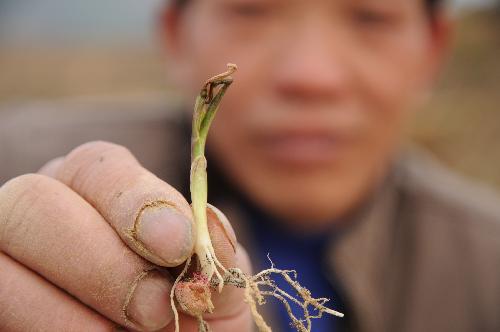Drought could lead to flood of inflation
2010-03-19 13:30 BJTSpecial Report: SW China Battles Severe Drought |
By Peng Kuang
BEIJING, March 19 -- China's current severe drought could aggravate inflation, driving commodity prices even higher.
 |
| A farmer shows a dying maize seedling at Linwang Village in Donglan County, southwest China's Guangxi Zhuang Autonomous Region, March 11, 2010. The sustaining severe drought has ravaged the region and other three provinces in southwest China since October last year. (Xinhua/Wei Lifu) |
A few days ago, the National Development and Reform Commission published the February CPI.
Last month, CPI rose 2.7 percent, close to the warning level of 3 percent. This reminds us that in China, the threat of inflation is still present.
The CPI index covers many prices related to daily life, and the price of food may be the most important.
According to the report, the decrease of rice production is expected to be 50 percent in Yunnan Province due to the drought. In Guizhou Province, drought has affected 86 of the province's 88 counties. The prices of vegetables in these provinces have started to increase, and could go even higher if the drought continues.
It has happened many times in history that drought incurred inflation. Just in February of last year, the drought in North China pushed wheat futures to the highest point in five months. From 2006 to 2009, a huge amount of food purchases by India were regarded as the main reason for high forward prices in international markets. In 2008, the price of wheat increased by 100 percent after India announced it would import 7 million tons.
In China, inflation is a key risk for the economy. In Premier Wen Jiabao's recent press conference after the two sessions, almost half of the questions he was asked were linked to related issues – the exchange rate, unbalanced international trade and the huge amount of new loans.
Inflation impacts not only the cost of daily life, but also China's position in international trades. The increase in costs for international business may cause export-oriented factories to close.
The risk started with the drought, but it may keep tipping over more dominos.
Attention needs to be paid to China's food stocks. In the past six years, China had good harvests. But the droughts in North and Southwest China in the last two years have threatened stocks in the short term.
To ensure food supplies in China, we also need to look at the international futures market. The recent price trend was not affected by China's drought. The wheat production worldwide is still sufficient. This could be the chance for China to replenish its stocks.
To stabilize the price of food, the impact of the financial system should be considered, too. Any abnormal conditions in the weather or society will cause hot money speculation. China should make all efforts to stop this dangerous behavior, which threatens its security.
In any market, all economic activities are intricately connected. A risk in one area will be spread, and the dominos will continue falling.
(Source: Global Times)
Editor: Jin Lin | Source: Xinhua
 Mail
Mail Share
Share Print
Print


 Video
Video









 2009 China Central Television. All Rights Reserved
2009 China Central Television. All Rights Reserved